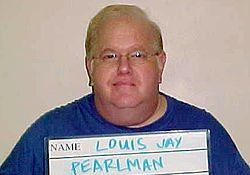Transcontinental Records
| Lou Pearlman | |
|---|---|

2007 arrest mugshot
|
|
| Born |
Louis Jay Pearlman June 19, 1954 Flushing, New York, U.S. |
| Died | August 19, 2016 (aged 62) Miami, Florida, U.S. |
| Cause of death | Cardiac arrest |
| Other names |
|
| Criminal charge | |
| Criminal penalty | 25 years in prison |
| Criminal status | Deceased |
| Musical career | |
| Genres | Dance-pop |
| Occupation(s) | Record producer, manager |
| Years active | 1993–2006 |
| Labels | Trans Continental Records |
| Associated acts | |
Louis Jay "Lou" Pearlman (June 19, 1954 – August 19, 2016) was an American record producer and fraudster. He was the manager of successful 1990s boy bands such as Backstreet Boys and NSYNC. In 2006, he was accused of running one of the largest and longest-running Ponzi schemes in history, leaving more than $300 million in debts. After being apprehended, he pled guilty to conspiracy, money laundering, and making false statements during a bankruptcy proceeding. In 2008, Pearlman was convicted and sentenced to up to 25 years in prison. He died in federal custody in 2016.
Pearlman was born and raised in Flushing, New York, the only child of Jewish parents, Hy Pearlman, who ran a dry cleaning business, and Reenie Pearlman, a school lunchroom aide. He was a first cousin of Art Garfunkel. His home at Mitchell Gardens Apartments was located across from Flushing Airport, where he and childhood friend Alan Gross would watch blimps take off and land. According to his autobiography, Bands, Brands, & Billions, it was during this period that he used his position on his school newspaper to earn credentials and get his first ride in a blimp. This is disputed by Gross, who claims he was the school reporter, and allowed Pearlman to tag along.
His cousin Garfunkel's fame and wealth helped fire Pearlman's own interest in the music business. As a teenager he managed a band, but when success in music proved elusive, he turned his attention to aviation. During his first year as a student at Queens College, Pearlman wrote a business plan for a class project based on the idea of a helicopter taxi service in New York City. By the late 1970s, he had launched the business based on his business plan, starting with one helicopter. He persuaded German businessman Theodor Wüllenkemper to train him on blimps and subsequently spent some time at Wüllenkemper's facilities in Germany learning about the airships.
...
Wikipedia
